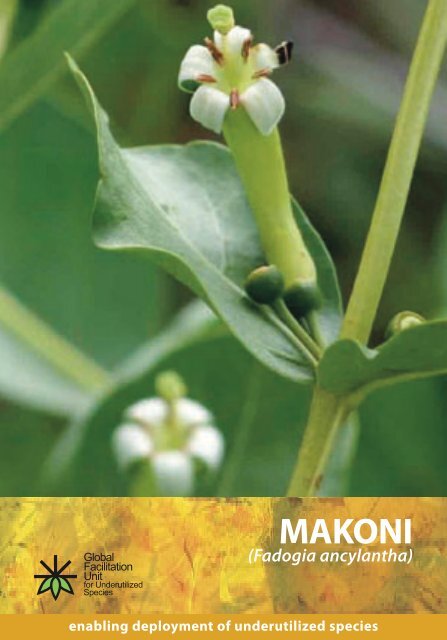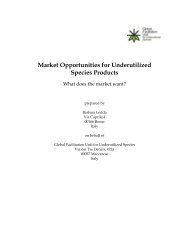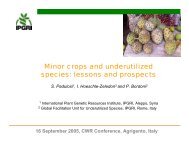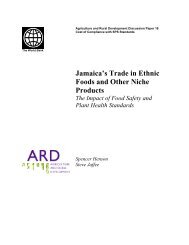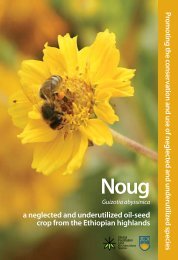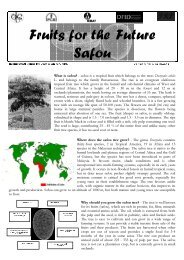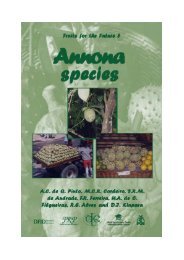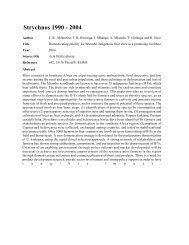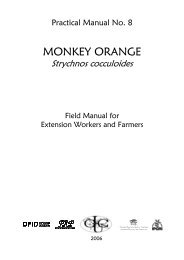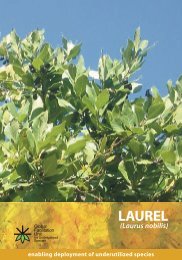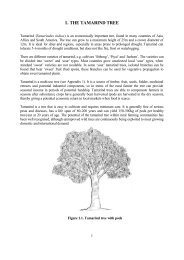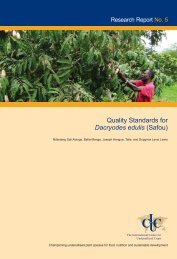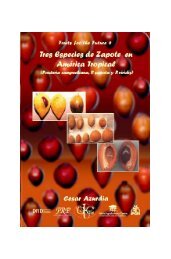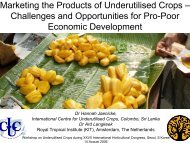MAKONI - Crops for the Future
MAKONI - Crops for the Future
MAKONI - Crops for the Future
You also want an ePaper? Increase the reach of your titles
YUMPU automatically turns print PDFs into web optimized ePapers that Google loves.
Global<br />
Facilitation<br />
Unit<br />
<strong>for</strong> Underutilized<br />
Species<br />
<strong>MAKONI</strong><br />
(Fadogia ancylantha)<br />
enabling deployment of underutilized species
What is Makoni and where does it come from?<br />
Also known as marange, makoni is a herb that grows widely in<br />
Zimbabwe but mainly in <strong>the</strong> Eastern Highlands in clumps on<br />
open woodland or grassland. The plant grows to a height of<br />
around 1 metre. In <strong>the</strong> past, <strong>the</strong> tea made from makoni has been<br />
regarded as a tea <strong>for</strong> poor people who were unable to af<strong>for</strong>d <strong>the</strong><br />
commercial brands. However, in recent years herbal teas have<br />
become popular with high-income earners in Zimbabwe and<br />
consumers from all over <strong>the</strong> world.
PROPERTIES<br />
Makoni tea is caffeine free and is rich in zinc.<br />
> Health<br />
Zinc is vital <strong>for</strong> <strong>the</strong> healthy working of many of <strong>the</strong> body’s<br />
systems. It is particularly important <strong>for</strong> growth, healthy sex<br />
organs, reproduction, insulin production and healthy skin.<br />
It is essential <strong>for</strong> a healthy immune system and resistance to<br />
infection. Makoni herbal tea can assist in boosting <strong>the</strong> immune<br />
system and can be used to complement modern medicines in<br />
chronically ill people including those suffering from AIDS and<br />
HIV related illnesses.<br />
> O<strong>the</strong>r Uses<br />
Makoni has an extensive range of traditional uses. Traditional<br />
healers use it to treat a variety of ailments including: boosting<br />
<strong>the</strong> immune system, abdominal pain - including menstrual<br />
pain, backache and chest pains, streng<strong>the</strong>ning bones, building<br />
stamina, antidote <strong>for</strong> poisoning - including snakebite, coughs<br />
and flu - including whooping cough, muscular toning, oedema,<br />
constipation, tropical ulcers, asthma, loss of appetite,<br />
hypertension. It is also thought to have aphrodisiac properties.<br />
The makoni herb is also used to treat diarrhoea in chickens, and<br />
stomach disorders in animals (turkeys, goats and cows).
<strong>MAKONI</strong><br />
GROWING<br />
Most of <strong>the</strong> areas where <strong>the</strong> herb grows have low agricultural<br />
output. The herb is a perennial plant, which lies dormant between<br />
July and October. New leaves and branches appear when <strong>the</strong> rains<br />
begin around October-November.<br />
HARVESTING<br />
The tea is said to be mature and ready when <strong>the</strong> leaves and <strong>the</strong><br />
stem turn yellow between April and July. The branches are <strong>the</strong>n<br />
cut and <strong>the</strong> leaves fermented by sprinkling some water onto<br />
<strong>the</strong> leaves and putting <strong>the</strong>m into a plastic bag until <strong>the</strong> leaves<br />
turn brown. They are <strong>the</strong>n left to dry. Once dry <strong>the</strong> tea is ready<br />
<strong>for</strong> consumption. Sometimes only <strong>the</strong> leaves are picked and <strong>the</strong><br />
branches are left to die. Also, <strong>the</strong> roots, stems and leaves have<br />
been harvested <strong>for</strong> processing into traditional medicines.<br />
PROCESSING<br />
The tea is processed by local producers in partnership with<br />
<strong>the</strong> Indigenous Tea Producers Association. The Indigenous Tea<br />
Producers Association undertakes crushing and testing of <strong>the</strong> tea<br />
on <strong>the</strong> producers’s behalf which enables <strong>the</strong>m to add value and<br />
increase <strong>the</strong>ir earnings from <strong>the</strong> tea.
Contribution to rural and social development<br />
Purchases of this tea help support rural communities earn<br />
a living while conserving <strong>the</strong>ir indigenous habitat. The<br />
international interest aroused by makoni tea was such that a<br />
local Non-Governmental Organisation, Sou<strong>the</strong>rn Alliance <strong>for</strong><br />
Indigenous Resources (SAFIRE), decided to commercialise it.<br />
Thus producers and SAFIRE work closely with <strong>the</strong> Indigenous<br />
Tea Producers Association to ensure that <strong>the</strong> makoni bush is<br />
managed sustainably and that <strong>the</strong> growers receive a fair price<br />
<strong>for</strong> <strong>the</strong>ir tea. A special committee is also responsible <strong>for</strong> ensuring<br />
that <strong>the</strong> tea is harvested sustainably and that <strong>the</strong> quality is of<br />
<strong>the</strong> highest standard. They are also responsible <strong>for</strong> crushing and<br />
sorting <strong>the</strong> tea which is <strong>the</strong>n sold on <strong>for</strong> processing into teabags.
<strong>MAKONI</strong><br />
The exhibits on show are just few<br />
of many commercial products made from <strong>the</strong> Makoni:<br />
Makoni herbal tea<br />
SOME PRODUCERS / RETAILERS / DISTRIBUTORS<br />
> Speciality Foods of Africa Pvt Ltd - www.tulimara.co.zw<br />
> Indigenous Tea Producers Association - www.safireweb.org<br />
Photographs by: Tulimara, PhytoTrade Africa and B. Wursten (www.zimbabweflora.co.zw)
Global<br />
Facilitation<br />
Unit<br />
<strong>for</strong> Underutilized<br />
Species<br />
For fur<strong>the</strong>r in<strong>for</strong>mation, contact:<br />
GFU <strong>for</strong> Underutilized Species<br />
Via dei Tre Denari, 472/a<br />
00057 Maccarese, Rome, Italy<br />
Tel: +39-06-6118-292/302<br />
e-mail: underutilized-species@cgiar.org<br />
w e b s i t e : w w w. u n d e r u t i l i z e d - s p e c i e s . o r g


